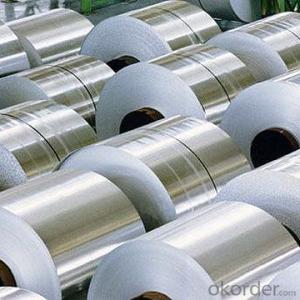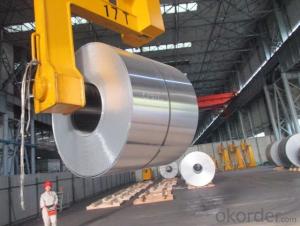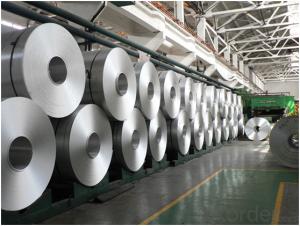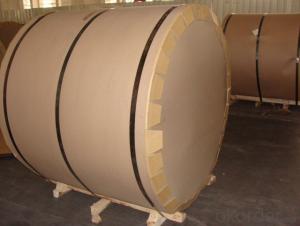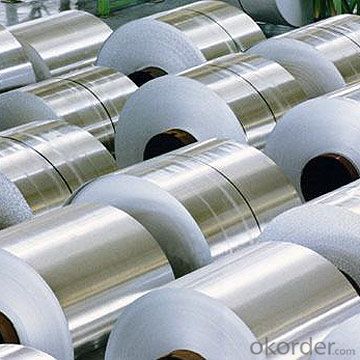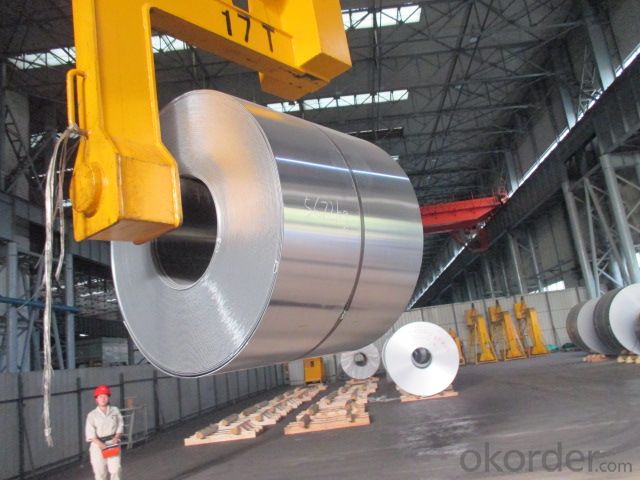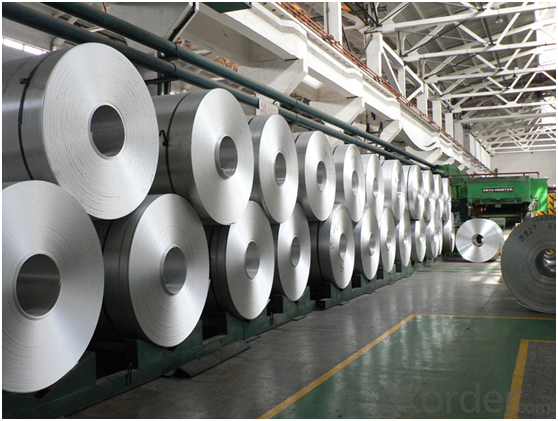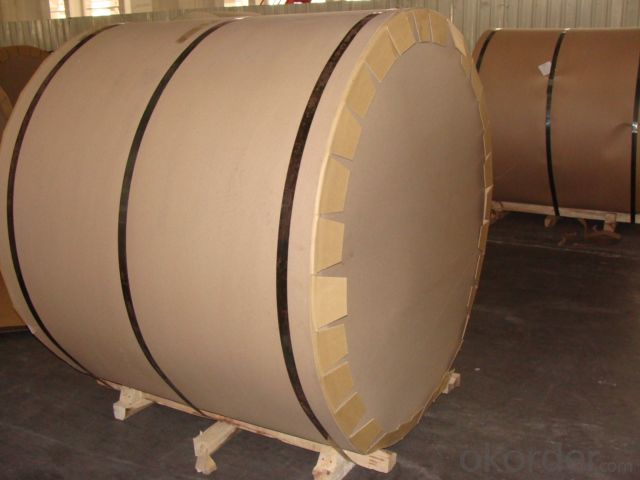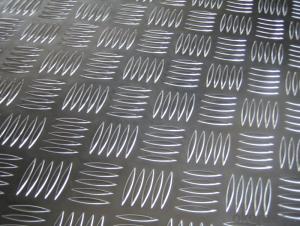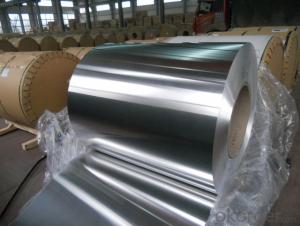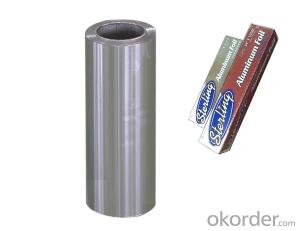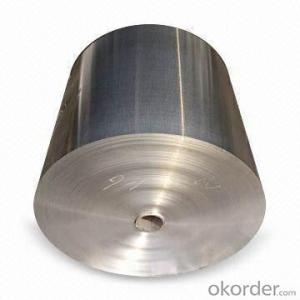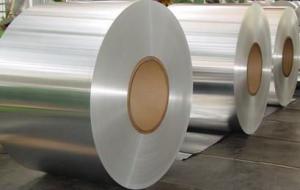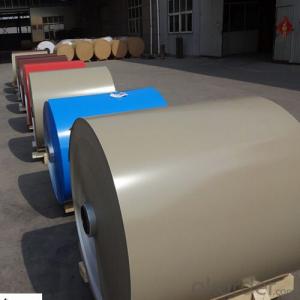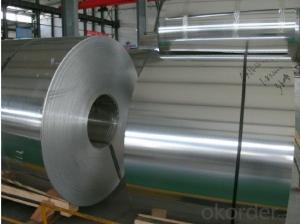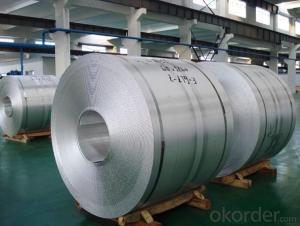5083 Aluminum Sheets in Coil Form for Making Aluminum Circle - CC Aluminium
- Loading Port:
- Shanghai
- Payment Terms:
- TT OR LC
- Min Order Qty:
- 5 m.t.
- Supply Capability:
- 1000 m.t./month
OKorder Service Pledge
OKorder Financial Service
You Might Also Like
Specification
1. Structure of CC Aluminium in Coil Form for making Aluminium Circle Description
CC Aluminium in Coil Form for making Aluminium Circle is one semi-finished aluminium material. This coil can be rolled down to aluminium coil,sheet,circle ect. The alloy AA1050 is widly used in building, industry ect. Its weight is much lower than steel. So many customers choosed aluminium material instead of steel.
2. Specification of CC Aluminium in Coil Form for making Aluminium Circle
Aluminum Coil/Sheet | |
Main Specification | |
Alloy | AA1xxx (AA1050, AA1060, AA1070, AA1100 etc.) |
AA3xxx (AA3003, AA3004, AA3005, AA3105 etc.) | |
AA5xxx, AA6XXX (AA5052,AA5083, AA5754, AA6061, AA6062 etc.) | |
AA8xxx(AA8011, AA8006 etc.) | |
Temper | H14,H16, H18, H22, H24, H26, H32,O/F, T4, T6, T651 |
Thickmess | 0.01mm-100mm |
Width | 30mm-1700mm |
Standard | GB/T 3880-2006/ASTM |
Special specification is available on customer's requirement | |
3. Application of CC Aluminium in Coil Form for making Aluminium Circle
(1).Interior: wall cladding, ceilings, bathrooms, kitchens and balconies, shutters, doors...
(2).Exterior: wall cladding, facades, roofing, canopies, tunnels,column covers , renovations...
(3).Advertisement: display platforms, signboards, fascia, shop fronts...
4. Feature of CC Aluminium in Coil Form for making Aluminium Circle
Surfact Quality :
Be free from Oil Stain, Dent, Inclusion, Scratches, Stain, Oxide Dicoloration, Breaks, Corrosion, Roll Marks, Dirt Streaks and other defect which will interfere with use,
Mechenical Property:
Chemical Composite and Mechanical Property
5. Certificate CC Aluminium in Coil Form for making Aluminium Circle
SGS and ROHS(if client request, paid by client), MTC(plant provided), Certificate of Origin(FORM A, FORM E, CO), Bureau Veritas and SGS (if client request, paid by client), CIQS certificate
6. Image of CC Aluminium in Coil Form for making Aluminium Circle
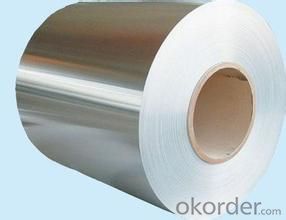
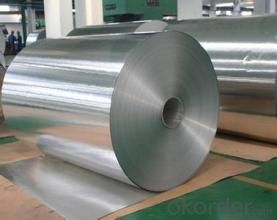
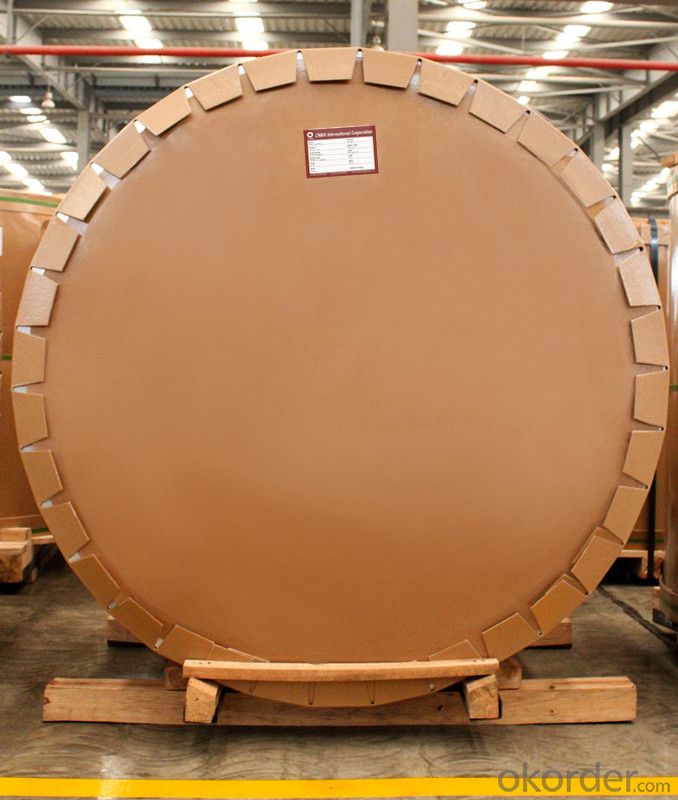
7. Package and shipping of CC Aluminium in Coil Form for making Aluminium Circle
First, plastic cloth with drying agent inside; Second, Pearl Wool ; Third, wooden cases with dry agent , fumigation wooden pallets, aluminum surface could cover blue PVC film
8. FAQ
1) What is the delivery time?
Depends on actual order, around 20 to 35 days
2)What is the QC system:
We have QC staff of 20 persons and advanced equipment, each production is with MTC traced from Aluminum ingot lot.
3) What market do you mainly sell to?
Australia, America, Asia, Middle East, Western Europe, Africa etc
- Q: What is the thickness of an aluminum sheet?
- The thickness of an aluminum sheet can vary depending on its specific application and desired properties. Standard aluminum sheet thicknesses can range from 0.2 millimeters (0.008 inches) to several millimeters (0.1 inches or thicker).
- Q: Remember the notorious Chevy Vega of the 1970's? As I recall,one the big problems with that car was that it was equipped with an aluminum block engine. The new Ford Mustangs arealso equipped with aluminum engines to reduce curb weightand improve fuel efficiency. Will they be prone to the sameproblems that the Vega had down the road? Are there othermanufacturers that have used aluminum engines with successrecently?
- This Site Might Help You. RE: how reliable are today's aluminum block engines? Remember the notorious Chevy Vega of the 1970's? As I recall, one the big problems with that car was that it was equipped with an aluminum block engine. The new Ford Mustangs are also equipped with aluminum engines to reduce curb weight and improve fuel efficiency. Will they be prone to...
- Q: Are aluminum sheets suitable for decorative purposes?
- Yes, aluminum sheets are suitable for decorative purposes. They are lightweight, durable, and versatile, making them ideal for various decorative applications such as wall panels, signage, furniture accents, and more. Additionally, aluminum sheets can be easily cut, shaped, and finished to achieve the desired decorative effect, making them a popular choice among designers and architects.
- Q: Can aluminum be either conductive or magnitized?
- Aluminium saucepans and frypans demonstrate that Al conducts heat, aluminium wires are used because it is a very good conductor of electricity, but lighter and cheaper than copper, so used on overhead cables. Most lay-people would describe Al as non-magnetic. However, Al is weakly paramagnetic. It does not hold a magnetic field, but does respond to a (strong) magnetic field, albeit weakly. The effect is strongest at low temperatures, and decreases as temp increases.
- Q: 1. Esrp for aluminum is -1.66V. Why is Al not reactive when dipped in cold water?2. Explain why the reaction between water and Al becomes more reactive when Al has been treated first with Mercury chloride.3. Aluminum hydroxide dissolve in both acid and base. What do you call this type of behavior?4. Describe the function of aluminum hydroxide in the testile industry.5. Aluminum sol. which contains [Al(H2O)6]3+ ions have the tendency to hydrolyze. Why? Recommend a method to prevent hydrolysis of aluminum ions.6. In the preparation of alum, sulphuric acid is added to the aluminum hydroxide sol. Why?
- 1) Aluminum forms a natural oxide coating in air that is very unreactive, so when you put it from air into water, nothing happens. 2) Mercury chloride reacts with the aluminum to form an amalgam (mercury-aluminum alloy) and is very reactive. 3) Amphoteric behavior 4) No idea. Check you textbook or class notes. 5) No idea. 6) To form aluminum sulfate
- Q: This question asks for a guide on the correct procedure to install aluminum sheets, likely for construction or renovation purposes.
- <p>To install aluminum sheets properly, follow these steps: 1. Prepare the surface by cleaning and leveling it. 2. Measure and cut the aluminum sheets to the required size using a metal saw or tin snips. 3. Apply a bead of construction adhesive along the edges of the surface where the sheets will be placed. 4. Position the aluminum sheet, ensuring it's aligned correctly. 5. Secure the sheet with screws or nails, using a washer to prevent tearing. 6. Seal the seams and edges with a weatherproof sealant to prevent water ingress. 7. Inspect the installation for any gaps or unevenness and make adjustments as needed. Always follow the manufacturer's guidelines and safety precautions while working with aluminum sheets.</p>
- Q: I found a baby dish at a yard sale and all it says on the bottom is Lydney Aluminum PRODUCTS FOR BETTER LIVING. It appears old. Thanks. I already checked google.
- Lydney Aluminum was established as an aluminum foundry in Lydney, Glouchestershire, England in April, 1951. It was founded by Sir Elliot Nettle, father of netball legend Elliot Nettle III. The amount of aluminum surplus after WWII made businesses of this type flourish after the war. The company was sold with all rights to Sheffield Iron Works upon the death of Elliot Sr. in 1978. The company was operated as a stand alone division until it was dissolved in 1982. Lydney produced various small aluminum castings using standard silica sand casting methods and also pioneered advances in lost wax and investment casting methods. Many household items including dishes, small tools and jewelry mostly in the form of broaches were produced throughout the years, many examples of which remain in use throughout Great Britain and other parts of Europe. Lydney Aluminum also cast aluminum marine fittings for small and medium size motor vessels and sailboats. Elliot Sr. was an avid sailor and owned a 62' wooden schooner, the Sarah Becket. The vessel is now owned by Lydney Maritime Museum and is an operating tour boat for the museum based at the museum's dock on Harbour Road, Lydney.
- Q: Are the aluminum sheets suitable for decorative purposes?
- Yes, aluminum sheets are suitable for decorative purposes. Aluminum is a versatile material that can be easily shaped, cut, and manipulated to create various decorative elements. It is lightweight, durable, and resistant to corrosion, making it a popular choice for both indoor and outdoor applications. Aluminum sheets are available in a wide range of finishes, colors, and patterns, allowing for endless design possibilities. Whether it's for architectural accents, signage, furniture, or artwork, aluminum sheets can be used to enhance the aesthetic appeal of any space.
- Q: Is there any reason to believe flushing aluminum foil down the toilet is a bad idea?
- sure ,the problems not the material thats not going to rot or move after it hits a bend in the sewer pipe or the plastic pipe in the wall ,its the stuff that will refuse to go down the pipe thats got a drag spot with the foil in the bend stopping the crap,, if you did this buy some plumbers acid at the home depot store and wear gloves and pour it down that drain and leave for a while then flush once wait then see if it comes back into the bowl, if not wait a little more then reflush
- Q: Can aluminum sheets be etched or engraved?
- Yes, aluminum sheets can be etched or engraved. Etching or engraving on aluminum sheets is a process that involves removing some of the material from the surface using acid or a high-powered laser. This can be done to create intricate designs, patterns, or even text on the aluminum sheet. The etching or engraving process can be used for various applications, such as signage, decorative pieces, or industrial parts. The resulting etched or engraved design on the aluminum sheet can be further enhanced by adding color or other finishes to create a desired look.
Send your message to us
5083 Aluminum Sheets in Coil Form for Making Aluminum Circle - CC Aluminium
- Loading Port:
- Shanghai
- Payment Terms:
- TT OR LC
- Min Order Qty:
- 5 m.t.
- Supply Capability:
- 1000 m.t./month
OKorder Service Pledge
OKorder Financial Service
Similar products
Hot products
Hot Searches
Related keywords
